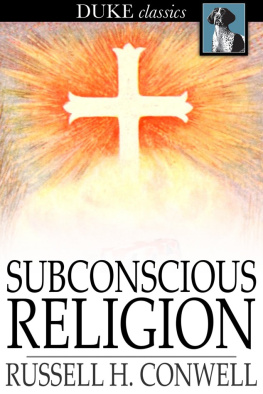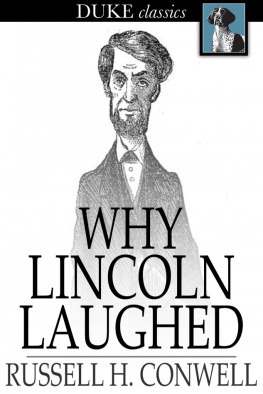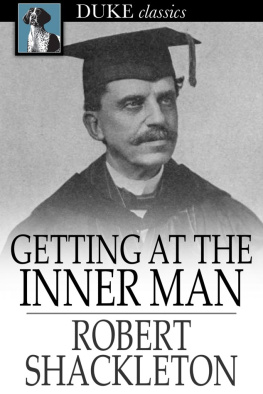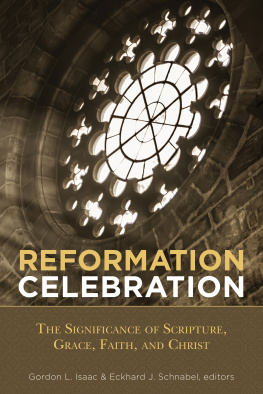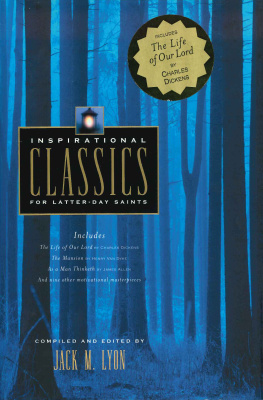Russell H. Conwell - Subconscious Religion
Here you can read online Russell H. Conwell - Subconscious Religion full text of the book (entire story) in english for free. Download pdf and epub, get meaning, cover and reviews about this ebook. year: 2014, publisher: Duke Classics, genre: Science. Description of the work, (preface) as well as reviews are available. Best literature library LitArk.com created for fans of good reading and offers a wide selection of genres:
Romance novel
Science fiction
Adventure
Detective
Science
History
Home and family
Prose
Art
Politics
Computer
Non-fiction
Religion
Business
Children
Humor
Choose a favorite category and find really read worthwhile books. Enjoy immersion in the world of imagination, feel the emotions of the characters or learn something new for yourself, make an fascinating discovery.
- Book:Subconscious Religion
- Author:
- Publisher:Duke Classics
- Genre:
- Year:2014
- Rating:3 / 5
- Favourites:Add to favourites
- Your mark:
- 60
- 1
- 2
- 3
- 4
- 5
Subconscious Religion: summary, description and annotation
We offer to read an annotation, description, summary or preface (depends on what the author of the book "Subconscious Religion" wrote himself). If you haven't found the necessary information about the book — write in the comments, we will try to find it.
Russell H. Conwell was an influential Baptist thinker and theologian whose famed lecture Acres of Diamonds gained worldwide acclaim in the late nineteenth and early twentieth centuries. The funds the speech garnered allowed Conwell to start Temple University, as well as other philanthropic and civic endeavors. In this short collection of essays, Conwell offers his own unique and uplifting take on a number of aspects of Christianity.
Subconscious Religion — read online for free the complete book (whole text) full work
Below is the text of the book, divided by pages. System saving the place of the last page read, allows you to conveniently read the book "Subconscious Religion" online for free, without having to search again every time where you left off. Put a bookmark, and you can go to the page where you finished reading at any time.
Font size:
Interval:
Bookmark:

First published in 1921
ISBN 978-1-63421-083-6
Duke Classics
2014 Duke Classics and its licensors. All rights reserved.
While every effort has been used to ensure the accuracy and reliability of the information contained in this edition, Duke Classics does not assume liability or responsibility for any errors or omissions in this book. Duke Classics does not accept responsibility for loss suffered as a result of reliance upon the accuracy or currency of information contained in this book.
What might be the consensus of opinion found in a digest of all thetestimonies of mankind cannot be surmised, but it did not appear thatGod was "a respecter of persons" through those years of prayer at theBaptist Temple. The prevailing belief, however, was that God was morewilling to answer the sincere disciple than he was to heed the requestsof a great sinner. But the fact was also evident that God does answerthe just and the unjust. The assertion of the blind man before thePharisees that "God heareth not sinners" was evidently a quotation fromthe Pharisees' creed and not a gospel precept. As all have sinned andcome short of the glory of God, no one would be heard if God would nothear sinners. Jesus was more inclined to heed the requests of John andPeter than he was to listen to the requests of the sacrilegiousSadducee. But a repentant Sadducee would not be neglected, and the factis apparent that there is a clear distinction between the influence withGod of a righteous man and the influence of a wicked or a frightenedsinner.
Here are a few of the testimonies which have a bearing on this importantsubject. One hardened sinner was so convicted of his completely lostcondition that he spent the night in agony, calling on God forforgiveness. He was determined to fight the battle alone, but hisstrength failed and he was certain that he was condemned irrevocably toeternal punishment. His prayer availed him nothing. When, at last, heopened his heart to a faithful Christian friend, that friend's prayerwas heard instantaneously, and the seeker knew by an instinct axiomaticthat he was received by the Lord.
There is a general belief that God does hear the pure Christian morereadily than he does the vile reprobate. That belief is founded in themoral laws universally recognized in human relations. There may also bea semiscientific reason. The soul which is in tune with the Infinite canmore effectively detect and understand the "sound waves" from the spiritworld than the soul which is out of tune with God. In the mass of thecorrespondence about which this book is written there are strongtestimonies to the necessity and attainableness of a practical harmonywith the Spirit of God. One man who has been long a teacher ofpsychology wrote that he had made a deliberate test of the matter, and acondensed report of his experience is here given. He sought "to placehis soul in communion with God." He desired that state of spiritualharmony with the divine character which would make him sensitive toevery spiritually divine impression. Hence, he prepared himself in thisway: he locked himself in his room and gave himself up to the seriousbusiness of getting into communication with God. He began to count hissins of commission and earnestly asking forgiveness; he promised theLord that he would guard himself against them evermore. He then tried tocomprehend the awful list of sins of omission which for a while made himhopeless of God's favor. But in deep and prayerful meditation, thinkinglong on the great mercy of God and of the propitiation Christ had given,he felt his soul slowly emerge from the slough of despond. Suddenly astrange confidence took possession of his soul and a feeling of gladtriumph overcame all doubt of his forgiveness. The assurance that he wasgetting into harmony with the Spirit of God became complete. He threwhimself across his bed and "let go of himself," making an absolutesurrender to the spiritual impressions.
Into such a state the apostles and prophets must have entered to feelthe spiritual impulses and see the visions which they recorded. It as anexaltation of the whole beinga temporarily superhuman experiencewhich may be the state of the soul when released from the body. The joyof that hour of oneness with God cannot be described to one who has notknown it. It is higher, purer, more real than other feelings. It is sounlike any other experience on earth. "The soul is lost in God." Theworshiper is outside and above himself. Life gleams as a cloud glows insome heavenly morning. Disease, pain, human limitations, care, oranxiety is nonexistent. A pure peace which passeth all understandingpermeates the whole being. Underneath are the everlasting arms; over himis the spirit face of Christ. But why should he try to convey an idea ofthat growing answer to his prayer? He knows he is with his Lord. But theless he tries to tell his experience the more confidence his unbelievingfriends will have in his sanity. That such harmony with the divine issubject to certain laws is seen in the fact that such elevation of soulis gained only by a full compliance with certain conditions. Some ofthese conditions are found by experience to be those which are laid downin the Scriptures. The seeker must force out of his heart all malice,jealousy, hate, selfishness, covetousness, unbelief, and give himself upto the opposite feelings. We must go over wholly to pure intentions,holy aspirations, truth-living, kindness, forgiveness, love for all,inflexible adherence to the right, and all in all harmonizing with thedivine disposition. Pure holiness must be sought, without which no mancan please God. All those who give themselves over to such a state ofsurrender to God have the full assurance of faith which is promised tothose who love God with all their hearts and with all their minds.
Such servants of God can offer prayer which avail much more than thefrightened call of the worldly minded, egotistic, and selfish enemy ofgood people and good principles. God loves all men with an everlastingaffection. But the kind of intensity of his affection for the saint andthe transgressor is quite different. Christ loved the priest and theLevite in a true sense, but he loved the Good Samaritan more. He canlove and care for his own without encouraging evil. He could not be justand show no partiality for those who obey him fully. He never fails tohear the cry of any contrite heart, but even among the disciples Johnwas especially beloved.
This chapter leads into the wilderness. Just beyond it is the insaneasylum. The most bewildering, confusing, and dangerous region is themorass of conflicting prayers. No human theory concerning them is evenhelpful. The labyrinth is absolutely trackless to the human mind whenonce the worshiper becomes entangled therein. So we will not attempt toexplain any of the even unthinkable intricacies of its strange region.Nowhere in the Bible does the Lord answer the questions which millionshave asked about it. Two persons, equally sincere, pray for success in amatter where the victory of one must be the defeat of the other. Nationsat war pray hard and long for victory, and not even God can answer both.Something must be taken from one to give to another, while the one inpossession is praying that he may keep it. One's loss is another's gain.The employer prays for a profit on his business, and the laborer praysfor higher wages. The white man and the colored man prays for his owntribe. The Samaritan and Jew, worshiping the same God and having thesame family inheritance, believe it is a duty to hate each other, andeach calls for God's curses on the other. Many an honest investigatorhas entered this region of doubt and mystery and managed to back outwhile still in his right mind. But he has returned the worse for theexperience. All sorts of foolish speculations have been given creedalexpression until men have declared, with strange assurance, that mancannot trust his reason or his conscience in any matter. They have triedto prove that the laws of nature are inflexible and that prayer cannothave any influence whatever in current events. Gifted men and women ofculture and high purpose have convinced themselves that there is noevil, that men never sin, that the Bible theories concerning prayer arefanciful and too miraculous to be possible. "Too much study hath madethee mad," said the practical Roman to the Apostle Paul. The old Romanhad probably seen so many religions that he had no faith in any. Thereligious maniacs are those men who have broken down their brains bylaborious study over these insoluble problems. Therefore, while no oneshould discourage reasonable research anywhere, and while it is notsacrilegious or foolish to think on these things, it does seem best toadmit that to the most faithful Christian there are unsearchable thingsof God which he cannot sanely hope to understand in this life. "Mythoughts are not your thoughts, neither are your ways my ways, saith theLord. For as the heavens are higher than the earth, so are my wayshigher than your ways, and my thoughts higher than your thoughts." Wecannot expect to achieve a knowledge as great and extensive as that ofthe Creator, and must be content with our reasonable limitations. "WhatI do ye know not now, but ye shall know hereafter." Satisfied, then,with the promise of that future full revelation we should study all thatProvidence places before us for investigation and never let go of whatwe are sure we do know. We will distinguish, as clearly as possible,between our imagination and our knowledge, and with a level head and ourfeet on solid ground we will live by a faith that is reasonable andnever become blindly reckless.
Font size:
Interval:
Bookmark:
Similar books «Subconscious Religion»
Look at similar books to Subconscious Religion. We have selected literature similar in name and meaning in the hope of providing readers with more options to find new, interesting, not yet read works.
Discussion, reviews of the book Subconscious Religion and just readers' own opinions. Leave your comments, write what you think about the work, its meaning or the main characters. Specify what exactly you liked and what you didn't like, and why you think so.

